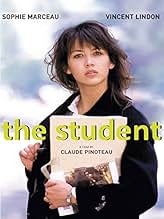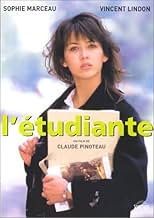PUNTUACIÓN EN IMDb
5,8/10
2,4 mil
TU PUNTUACIÓN
Añade un argumento en tu idiomaWeeks from her final exams, part-time teacher Valentine meets a very different musician. Just a one-night stand and back to preparing for exams, she thinks.Weeks from her final exams, part-time teacher Valentine meets a very different musician. Just a one-night stand and back to preparing for exams, she thinks.Weeks from her final exams, part-time teacher Valentine meets a very different musician. Just a one-night stand and back to preparing for exams, she thinks.
- Premios
- 1 nominación en total
Argumento
¿Sabías que...?
- CuriosidadesReuniting the creative team with actress Sophie Marceau, is often seen as a quasi-sequel or spiritual successor to La fiesta (1980) and Quince años recién cumplidos (1982).
- ConexionesFeatured in ¿Qué hora es? (1989)
Reseña destacada
After her withdrawal from "La septième cible", Sophie Marceau and Claude Pinoteau had a strained relationship. The director who had discovered the now ambitious actress felt betrayed by her decision to leave his movie, and didn't talk to her for four years. Still, every bad thing has some good consequences, and Sophie Marceau's participation in more complex films during her period of misunderstanding with Pinoteau allowed her to play even more convincingly when they reconciled in "L'étudiante". It was "La Boum" for the now grown-up original audience. "La Boum" in university.
Like Vic before her, Marceau's new heroine, Valentine, a student, is one of the most relatable kind. Opinionated and smart, she charms not only with her presence, but also with her words. It is though the former that she makes a young jazzman, Ned (Vincent Lindon) fall for her. Believing it to be just a one-night adventure, she goes out with him. But she can't get him out of her head on the days that pass. Is it love? For her, surely, but she can't sacrifice five years of studying for a relationship. Balancing her love life with her studies will prove to be the theme of this charming movie.
Despite having called the protagonist relatable, one can recognise that her personality has some exaggerated elements. She is, I think, too intellectual to be believable, and her arguments over sociological or political matters have no substance or purpose in a romantic comedy. It's as if she's trapped in the wrong film. For all that, though, her relatability stems from the fact that she has to balance two different aspects of her life, both prevalent in the university years. Not many people have had - or would have - relationships with touring musicians, but many would have partners for whom the importance of university would be incomprehensible. A classic workaholic, Valentine can't let Ned make her effort go to waste. She needs to succeed, and love doesn't let her do that.
Speaking of Ned, he also has his fair share of contradictory elements. While he wants to become a famous musician, he is too careless and lets valuable opportunities to unused. Too submissive to impose his presence, he unsuccessfully tries to record a film score, only to learn that his place has been taken by someone else, and does nothing. The only person understanding him is Valentine, and it is the meeting of these antithetic characters that gives the film its charm.
For this reason, the film is clearly commercial. Only a commercial film could survive with such a contradictory cast. What saves it is the cast's interaction, full of emotion, and the aforementioned plot, with its fair degree of relatability. Its resembling of "La Boum", with its relentless optimism, and its faith in true love, that prevails even in situations when it seems impossible. It is, surely, cheap, a cash-grabber, aimed to an audience that still carried their love of "La Boum" with them. But it is a gentle one. Even if it was made for money, it makes up for it using the same formula that made "La Boum " successful. One combining innocence and relevant maturity, with a soundtrack that sticks to the ear for days to come.
It is, as mentioned above, "La Boum" for university students. Nothing more and nothing less. One can't, and mustn't expect a lot from such films. They exist for other reasons. To make us dream, and feel joy. To make us travel back in a time when the University of Paris was still called the Sorbonne, and putting a Walkman in someone's ears was an indication of love.
For all its cheapness, it is as romantic and nostalgic as can get. And for that, it is invaluable.
Like Vic before her, Marceau's new heroine, Valentine, a student, is one of the most relatable kind. Opinionated and smart, she charms not only with her presence, but also with her words. It is though the former that she makes a young jazzman, Ned (Vincent Lindon) fall for her. Believing it to be just a one-night adventure, she goes out with him. But she can't get him out of her head on the days that pass. Is it love? For her, surely, but she can't sacrifice five years of studying for a relationship. Balancing her love life with her studies will prove to be the theme of this charming movie.
Despite having called the protagonist relatable, one can recognise that her personality has some exaggerated elements. She is, I think, too intellectual to be believable, and her arguments over sociological or political matters have no substance or purpose in a romantic comedy. It's as if she's trapped in the wrong film. For all that, though, her relatability stems from the fact that she has to balance two different aspects of her life, both prevalent in the university years. Not many people have had - or would have - relationships with touring musicians, but many would have partners for whom the importance of university would be incomprehensible. A classic workaholic, Valentine can't let Ned make her effort go to waste. She needs to succeed, and love doesn't let her do that.
Speaking of Ned, he also has his fair share of contradictory elements. While he wants to become a famous musician, he is too careless and lets valuable opportunities to unused. Too submissive to impose his presence, he unsuccessfully tries to record a film score, only to learn that his place has been taken by someone else, and does nothing. The only person understanding him is Valentine, and it is the meeting of these antithetic characters that gives the film its charm.
For this reason, the film is clearly commercial. Only a commercial film could survive with such a contradictory cast. What saves it is the cast's interaction, full of emotion, and the aforementioned plot, with its fair degree of relatability. Its resembling of "La Boum", with its relentless optimism, and its faith in true love, that prevails even in situations when it seems impossible. It is, surely, cheap, a cash-grabber, aimed to an audience that still carried their love of "La Boum" with them. But it is a gentle one. Even if it was made for money, it makes up for it using the same formula that made "La Boum " successful. One combining innocence and relevant maturity, with a soundtrack that sticks to the ear for days to come.
It is, as mentioned above, "La Boum" for university students. Nothing more and nothing less. One can't, and mustn't expect a lot from such films. They exist for other reasons. To make us dream, and feel joy. To make us travel back in a time when the University of Paris was still called the Sorbonne, and putting a Walkman in someone's ears was an indication of love.
For all its cheapness, it is as romantic and nostalgic as can get. And for that, it is invaluable.
- eightylicious
- 9 abr 2022
- Enlace permanente
Selecciones populares
Inicia sesión para calificar y añadir a tu lista para recibir recomendaciones personalizadas
- How long is The Student?Con tecnología de Alexa
Detalles
- Duración1 hora 44 minutos
- Mezcla de sonido
- Relación de aspecto
- 1.66 : 1
Contribuir a esta página
Sugerir un cambio o añadir el contenido que falta

Principal laguna de datos
By what name was La estudiante (1988) officially released in India in English?
Responde

























